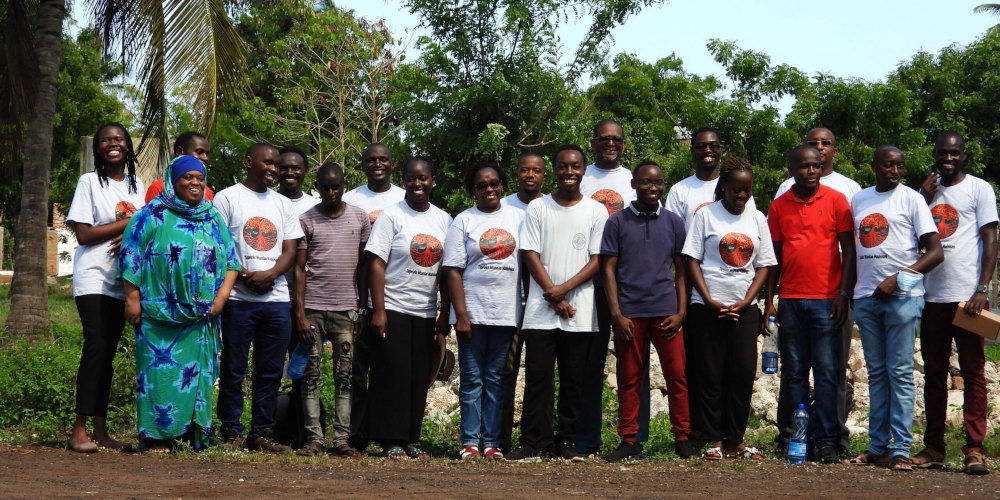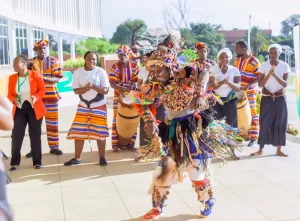The “Connecting the Unconnected: Supporting community networks and other community-based connectivity initiatives” is a project being implemented by the Association of Progressive Communications in partnership with Rhizomatica that focuses on addressing the human capacity and sustainability challenges, along with the policy and regulatory obstacles, that limit the growth of community-based connectivity initiatives. The multi-year, multi-donor initiative aims to contribute towards creating an enabling ecosystem for the emergence and growth of community networks and other community-based connectivity initiatives in the global south.
In Africa, APC partners with the Kenya ICT Action Network (KICTANet) as its implementing partner hosting the regional coordinator. In 2019, the project welcomed BOSCO Uganda (Uganda), Centre for Youth and Development (CYD) (Malawi), Ensemble Pour la Différence (Democratic Republic of Congo) and Zenzeleni (South Africa) as the first set of peer organisations who were joined by Tunapanda Kibera CBO (Kenya) and Centre for Information Technology and Development (CITAD) (Nigeria) in 2020.
Community Networks in the African Context.
The essence of community networks is more than the infrastructure. It’s giving communities power to self-determination, to build/adapt/use technologies that reflect their values, needs and priorities. In African countries where community networks exist, the idea is introduced by either a local or external champion who then gets buy-in from some members of a community. They then take up the role of creating awareness and adding more community members on board. For instance, PamojaNET in DRC was initiated by an organization called La Difference at the request of the Idjwi King/Mwami. Zenzeleni’s roots are a collaboration between university researchers and local community members while BOSCO Uganda is under the trusteeship of the Catholic Archdiocese of Gulu. In all instances, there is usually support from local authorities. For example, Zenzeleni works together with the headmen from Mankosi and Zithulele villages (local tribal authorities) and in DRC PamojaNET works together with the Mwami/King in Idjwi. This sense of community ownership has seen local community members and local authorities play a key role in mobilization and advocacy at local, national and regional levels. This grows into a collaboration with existing social/economic groups such as cooperatives or non-profit organisations that may not necessarily have started offering internet or intranet services. The reality is that in many of these communities there may not exist skills to operate and manage the network initially. However, we have great examples from countries such as Nigeria with Fanstuam Foundation starting training programs for youth in the community to learn network operations skills. Others include DRC PamojaNET, BOSCO Uganda, Murambinda in Zimbabwe, Tunapanda in Kenya, Zenzeleni and SOWUG in South Africa where community networks are building local capacities to deploy and operate community networks.
In terms of ownership, leadership and governance, there exists an anchor organisation that becomes the legal vehicle for the community network. The community-led anchor organization role is:
- Service provision: acting as a gateway to helping people get access to the services they need like the internet, and locally hosted content such as e-learning, e-health.
- Resource mobilization for network costs, from capital expenditure to operating expenditure.
- Partnerships both local and external.
- Advocacy: Calling for changes in policies.
- Support community groups/organizations within the collective through capacity building.
- Strengthen community ownership through participation and involvement.
Some of the areas the APC-LOCNET Project is Contributing to the Community Networks Ecosystem are peer exchanges, institutional strengthening including capacity building, and regional and national movement building.
1. Supporting Peer Exchanges.
As community networks evolve, they gain valuable lessons, practices and knowledge. In Africa, we are yet to see the continuous and consistent exchange of these practices among community networks. By engaging in these exchanges, the peer community networks can use this platform to transfer knowledge, experiences, innovations and skills from one community network to another. In 2019, the four peer organisations namely BOSCO Uganda, La Difference, CYD Malawi and Zenzeleni participated in peer exchange travels.
- Peer Exchange Travel to Zenzeleni – Peers from BOSCO Uganda, CYD Malawi together with the regional coordinator visited the Zenzeleni Mankosi cooperative. The visit was a four day trip with different activities planned from visiting the Zenzeleni Mankosi cooperative and deployment of access points in the community.
- Peer exchange travel to BOSCO Uganda – Peers from La Difference, CYD, Zenzeleni together with the regional coordinator visited BOSCO Uganda. The 3 days were spent visiting the different community ICT centres, towers, and schools that are part of the community network. The visiting members got to interact with youth, women, men, and students who use the network. They learned how the organization had worked on creating localized digital content in the local Acholi language. The content varied from digital literacy training material to peace and conflict resolution. One of the highlights from the visit was learning how to power a network using solar electricity and how that can also translate to contributing to the sustainability of the network.
- Peer Exchange Travel to CYD Malawi – CYD Malawi piloted UmojaNET in 2019. The community network builds on the work which CYD has been doing in promoting digital inclusion in schools through the provision of computers and training teachers on digital literacy. The organization in partnership with Turing Trust has donated over 500 computers to primary and secondary schools. The main focus of the exchange visit was to conduct training for the CYD staff on operating and maintaining a community network.
Due to the COVID-19 pandemic, peer exchanges continue online in 2020 and 2021. The online exchange sessions included topics such as e-learning platforms, solar power, network operations and management. Running a community network is quite challenging and not only have these peer exchanges provided a platform for cross border collaborations and partnerships but also helped build a support system for community networks to build solidarity and offer mutual support.
2. Supporting Institutional Strengthening and Capacity Building.
The goal of providing institutional strengthening and capacity-building support is to enable the peer organisations to identify institutional and capacity gaps and find solutions to issues that might threaten the sustainability of the community network. Since 2019, the peer organisations have received capacity building support which in some areas came in the form of expert training. For example in 2019, La Difference technologist completed training in two modules (Ubiquiti Broadband Wireless Admin and Ubiquiti Wireless Enterprise Admin) and in 2021 the peers from Zenzeleni, CITAD, Tunapanda, La Difference and CYD received training on social entrepreneurship and financial management from The Institute for Social Entrepreneurship in Asia (ISEA).
3. Supporting Regional and National Movement Building.
When community networks in Africa come together in an organized way, the more power they have in exercising change. At the regional level, KICTANet has been spearheading advocacy efforts on the creation of enabling policy and regulatory environments for community networks. The network has also been quite instrumental in raising awareness on community networks at national, regional and global levels. In 2021, KICTANET through collaboration with APC worked with the Communications Authority of Kenya to create a license and shared spectrum framework for community networks, meaning that not for profit telecom providers can get a license for KES1000 (USD10) with an annual operation fee of KES5000 (USD50).
As part of the national movement-building, the LocNet project is supporting the training and mentoring of seven community networks and creating a community of practice for CNs in Nigeria (lead by CITAD), South Africa (lead by Zenzeleni) and Kenya (lead by Tunapanda) supported by an advisory committee in each of the countries. This work includes:
- Selecting the seven local organisations in each based on robust digital inclusion criteria.
- Assessing the training needs of the local organisations and designing and delivering training workshops and a mentorship program that addresses their capacity gaps.
- Developing an initial cost analysis for the infrastructure that each local organisation requires, and facilitating resource mobilisation (i.e. identifying potential funders).
- Convening and facilitating online and offline (or in-person) interactions to strengthen the relationships among the local practitioners in each of the countries.
As community networks continue to grow and mature, more investments need to go into building institutional capacities both the meso and micro level to ensure scalability and sustainability.
This is a series of our publications on Community Networks.
Josephine Miliza is a network engineer passionate about enabling communities in Africa to leverage digital technologies for socio-economic empowerment. She is the outgoing KICTANet Africa regional coordinator for the APC-LOCNET project. Her new role is the Africa policy coordinator working on the same issues. Twitter – @Msmiliza.
![]()




